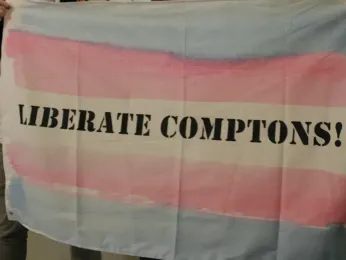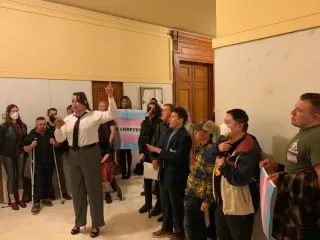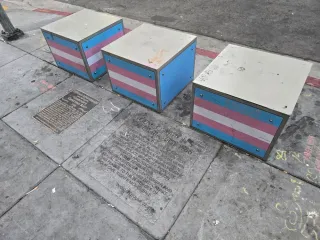
Aug 22
Compton’s activists to regroup after losing rehearing request
Eliot Faine READ TIME: 4 MIN.
After the loss of their request for a rehearing aimed at ousting private prison operator GEO Group from a site of historical transgender resistance in San Francisco, local activists known as the Compton’s x Coalition are regrouping to consider their next steps. The setback came amid observances of August as Transgender History Month.
The rehearing this week before the San Francisco Board of Appeals had been requested by activists following the board’s 4-1 decision in July to uphold a zoning letter of determination that allows GEO Reentry Services, a subsidiary of GEO Group Inc., to continue to utilize 111 Taylor Street as a halfway house for formerly incarcerated people. The site used to house Gene Compton’s Cafeteria, where there was a riot in August 1966 to protest police harassment of LGBTQ people.
Although a writ, a lawsuit that would take the Board of Appeals to San Francisco Superior Court, was originally on the table, Compton’s x Coalition spokespersons Chandra Laborde and Wilder Zeiser told the Bay Area Reporter that the coalition will instead refocus its efforts toward the upcoming Board of Supervisors hearing to investigate GEO Group’s operations at 111 Taylor Street, as well as pursuing a community-landmark designation .
The Board of Appeals voted 3-2 Wednesday, August 20, to deny a request for a rehearing of its July 16 decision that upheld the letter of determination for the GEO Group.
The building’s ground floor commercial space had housed Gene Compton’s Cafeteria, where one night 59 years ago this month - the exact date has been lost to history - a drag queen reportedly threw a cup of hot coffee in the face of a police officer who tried to arrest her without a warrant. The incident sparked a riot between trans and queer patrons of the 24-hour diner and cops, as detailed in the 2005 documentary "Screaming Queens" by transgender scholar and historian Susan Stryker, Ph.D.
The property earlier this year became the first one of its kind granted federal landmark status specifically for its connection to the transgender movement in the U.S. It is also now on the California Register of Historical Resources.
In 2022, San Francisco officials had landmarked the intersection of Turk and Taylor in front of the building in recognition of the uprising by the LGBTQ Compton’s patrons. The city's 307th landmark also included portions of the structure's exterior walls containing the commercial space that had housed the Compton’s eatery on both the Turk and Taylor street facades.
For 36 years, GEO Group, a private prison operator and federal Immigration and Customs Enforcement contractor, has been operating a reentry facility at the location.
Laborde, the appellant of the original letter of determination, was represented at Wednesday’s governance meeting by Laura Strazzo, a land use attorney. Strazzo had been officially retained less than a day before.
In order for anyone to present a rehearing request to the Board of Appeals, they must adhere to the appeal procedure, which states that new or different evidence shall be brought before the board in extraordinary cases and “to prevent manifest injustice” .
Strazzo presented the new evidence, chief among which was the death of former 111 Taylor Street resident Melvin Bulauan on July 14. He was found dead on the sidewalk, just up the street from the facility, after having been transferred there the day before. News of Bulauan’s passing came from his son, Anjru Jaezon de Leon, the day after the appeals board upheld the housing determination in July.
Strazzo also pointed out the discrepancies between the legal requirements of group housing, such as long-term residential arrangements and communal kitchen use, and GEO Group’s facility. She noted it reportedly does not offer at 111 Taylor Street such group housing amenities.
“My understanding is that [GEO Group is] not complying with the rent ordinance for just-cause eviction protections. … Every other group housing use, once you’ve been there 30 days you get eviction protections. And [at 111 Taylor Street], after six months they say ‘you’re out, you’re on the street,’ that’s a really different use.” Strazzo told the board.
She noted that the precedent set for this determination will impact how group housing is considered in San Francisco.
“By making this determination that this type of use falls under group housing, that opens the door for this use to be in any zoning for group housing.” Strazzo said.
GEO Group attorney David Blackwell argued there was no “smoking gun,” or manifest injustice, that the Compton’s x Coalition had presented.
“This is a rehashing of the same arguments as before,” Blackwell said, “The rehearing request must state the nature of new facts or circumstances, names of the witnesses, and why the evidence was not produced at the July 16 hearing. There’s none of that here. There’s just these vague statements of, ‘well, we may have interviewed somebody, we might have some new information’, that just does not cut it for a rehearing request.”
Both Blackwell and city Zoning Administrator Corey Teague agreed that the rehearing request should not be granted.
Commissioner Rebecca Saroyan moved to deny the request on the basis that the board did not find the stipulations of the appeals process had been met.
Compton’s x Cafeteria will host an event at Counterpulse Saturday , August 23, to involve community voices in the future of 111 Taylor Street. The event is sold out.
There will be a vigil at 111 Taylor Street for Bulauan on Saturday, August 30, from 7 to 8:30 p.m. (Update, 8/30/25: The vigil has been postponed to October.)
Updated, 8/23/25: This article has been updated with the time of the August 3o vigil



